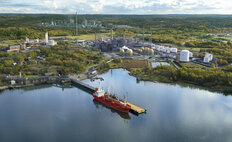- A feasibility study for a chemical recycling unit in Stenungsund, Sweden is underway, funded partly by the Swedish Energy Agency.
- Operations are expected to begin in 2024, pending a successful feasibility study and final investment decision.
- Stena Recycling will sort and deliver plastic waste to the new unit, while Fortum Recycling and Waste will apply for funding for a related feasibility study.
- The unit will produce high-quality base chemicals and polyolefins from chemically recycled feedstock.

Feasibility Study for Chemical Recycling Unit
Borealis has initiated a project to increase the supply of chemically recycled feedstock for circular base chemicals and polyolefin-based products. A feasibility study for a chemical recycling unit at their Stenungsund, Sweden site is currently in progress, partially funded by a grant from the Swedish Energy Agency. The study is being conducted in partnership with Stena Recycling, and operations are anticipated to start in 2024, contingent on a successful feasibility study and final investment decision.
Collaboration with Stena Recycling and Fortum
Stena Recycling will handle the sorting and delivery of plastic waste to the new chemical recycling unit. They plan to invest in their own facilities to support circular plastic solutions. Additionally, Borealis will collaborate with Fortum Recycling and Waste on sourcing plastic waste for the unit. Fortum is applying for public funding to conduct a feasibility study to define technical requirements for pre-treatment, quality control, and sourcing of suitable materials.
Advancing Plastics Circularity
Chemical recycling complements mechanical recycling by converting lower-quality plastic waste into high-quality base chemicals and polyolefins. This process produces olefins from chemically recycled synthetic crude oil, matching the quality of those derived from fossil fuels. This enables the production of high-end applications, such as healthcare and food packaging materials, which require stringent quality and safety standards.
Integration and Certification
The chemical recycling unit will integrate with the existing Cracker at Borealis' Stenungsund site, which has been ISCC PLUS certified since February 2021. This integration aims to replace fossil-based feedstock on a larger scale with chemically recycled feedstock via the mass balance model, accelerating the transition to plastics circularity.

